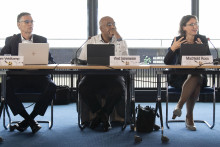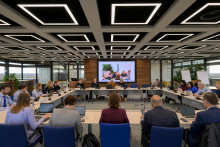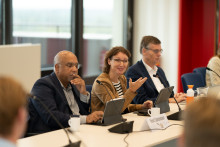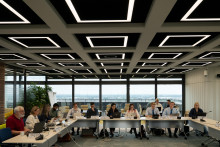Concerns about Shaping2030 commitment and progress
The University Council shared its ‘slight concerns and worries’ about the UT’s vision, Shaping2030. As Imke Verschuren from student party UReka explained, there are ‘several important players within the UT that don’t seem to be fully supportive of the strategy’. And since Shaping2030 has been introduced a few years ago, the council would expect all relevant stakeholders to be on board by now. The council also mentioned the Shaping Expert Groups (SEGs) – groups that have been active for quite a while and are supposed to be disbanded by the end of this calendar year. The University Council finds it worrisome that ‘the most important questions were still in the to be developed-category’.
In his response, President Vinod Subramaniam said that the lack of support is a ‘misinterpretation’. ‘I think the community in general is supportive of Shaping2030, but the mileage varies a little bit. Some people are fervent and passionate. Others understand general direction, but still have questions and concerns. We’re still actively discussing things, even what it means to be people-first. This is a living document.’ Subramaniam also discussed the outcomes of the SEGs. ‘Some things are already completed and implemented, for instance in the Diversity, Equity and Inclusion policy. I think we’re on track. Sometimes elements from Shaping are already implicitly linked to other visions. We can look to make things more explicit. The assignment for us is to further develop Shaping2030 with the broader community, not only in smaller groups.’
Privacy concerns about AFAS
After the critical comments from the University Council about the HR system AFAS last December, the topic was again on the table this morning. This time, the council was quite positive about the efforts that were made to improve the system and resolve issues in the meantime. Despite the positive developments, the council still had some concerns with regards to the user friendliness and interface of the system. Emile Dopheide (Campus Coalition) also mentioned that employees don’t know where to go with a question or complaint.
But the most urgent point he raised has to do with letters of application by potential new employees. According to Dopheide, these cannot be erased from the AFAS system – while the UT should adhere to the GDPR (privacy) law.
Vice President Machteld Roos responded that she needs to doublecheck with HR whether that issue has been resolved or not. ‘I know they have been working on a workaround and in the meantime we’re looking to replace this specific module in the system.’ Roos also mentioned that there should be more communication. ‘I think we can emphasize more that we’ve been working on improvements. And a lot of people don’t know that there is an Ask HR button in the AFAS system. We will draw attention to that as well.’
The Apeldoorn location
In collaboration with Saxion, the national police academy, Royal Netherlands Army and other partners, the UT is setting up a ‘Centre for Safety and Digitalisation’ in Apeldoorn. Now this centre is taking shape, the University Council shared its remarks about two topics: capacity and quality assurance. Pieter Boerman (Campus Coalition) mentioned that the centre is ‘a good example of the Life Long Learning journey the UT is embarking on’. ‘But if we are expanding and enlarging our primary process, we need more staff. Plus, people gets a certificate after completing a course the UT offers in this centre. Especially if the UT’s name is on official certificates, we need to take quality assurance into account.’
Rector Tom Veldkamp responded by saying that the involved faculties (EEMCS and BMS) have committed to having sufficient staff available for the centre. ‘This is not meant to be an additional teaching load for existing staff’, he explicitly mentioned. Veldkamp also mentioned ‘exploring a quality assurance system’. ‘This centre in Apeldoorn is a bit ahead of the game when it comes to Life Long Learning, these are new types of learners. For any kind of diploma or certificate, we will need to have a quality assurance system in place. We’re aware of our responsibility.’
Selection and numeri fixi
Starting the upcoming academic year, the UT will have three bachelor’s programmes that have a numerus fixus: Technical Medicine (which has always had a numerus fixus), Technical Computer Science and Psychology. The University Council discussed all three programmes and primarily focused on the accessibility of the programmes.
In the case of Psychology, the council is mostly concerned about students being scared off by the numerus fixus and wants regular re-evaluations – every year – ‘to prevent an unpredicted low influx’. Similar concerns apply to the Technical Computer Science programme, although there was specific attention to female and Dutch students. Council member Dick Meijer mentioned that ‘our primary task is to educate Dutch students, that’s what we receive a lot of tax money for. We cannot afford to refuse or scare off Dutch students.’
Rector Tom Veldkamp said that extra attention is going to female students interested in Technical Computer Science. ‘We’d like to have more female students in the programme and efforts are being made to make the texts in our communication about the programme more gender neutral. Above all, we want students to find the right programme for them. The programmes think the scaring off effect that potential students might experience will not be that big. We will monitor closely, but after such measures, programmes usually tend to find an equilibrium after a few years.’







